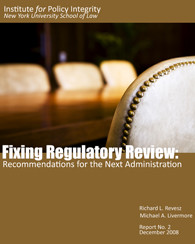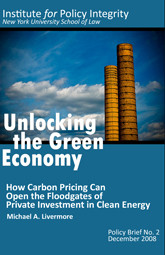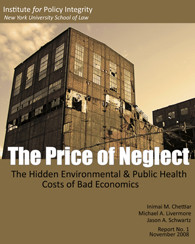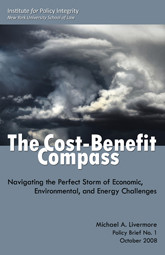-
Policy Integrity’s recommendations incorporated into EECA report
Today, Policy Integrity received favorable feedback on comments we submitted on draft EPA Guidelines for Preparing Economic Analyses supporting positive changes made in the new draft and suggest additional improvements. The document has been an influential resource for EPA’s consideration of regulatory costs and benefits.
-
Comments in support of the rescission of the Physician Conscience rule
With litigation pending by ACLU, Planned Parenthood, the State of Connecticut and six other states against the physician conscience rule, the new Obama Administration proposed a rescission of the rule. Policy Integrity joined the coalition to submit comments in support of that action.
-
Legal memorandum on stopping midnight regulations
Shortly after his inauguration, President Obama took steps to halt the adoption or implementation of regulations that went into the pipeline during the final days of the Bush Administration.
-

Fixing Regulatory Review
Recommendations for the Next Administration
Fixing Regulatory Review: Recommendations for the Next Administration provides a set of recommendations for the Obama Administration to improve the process of regulatory review. It includes ten principles that should inform regulatory review and cost-benefit analysis of regulation, as well as a detailed markup of the Executive Order signed by President William Jefferson Clinton that established the structure of review that is currently in place.
-

Unlocking the Green Economy
How Carbon Pricing Can Open the Floodgates of Private Investment in Clean Energy
Unlocking the Green Economy: How Carbon Pricing Can Open the Floodgates of Private Investment in Clean Energy calls for the Obama Administration to implement carbon pricing as a necessary step to transition to a green U.S. economy.
-
Comments on EPA’s Guidelines for Preparing Economic Analyses
In September 2008, EPA’s National Center for Environmental Economics released a new draft of its Guidelines for Preparing Economic Analyses. In the past, that document has not only been a key resource for EPA’s consideration of regulatory costs and benefits, but it has also influenced the analytical processes used by state agencies and other federal agencies.
-

The Price of Neglect
The Hidden Environmental and Public Health Costs of Bad Economics
This report examines the regulatory failures of the Bush years on issues as wide-ranging as climate change and workplace safety, and concludes that these failures did not arise because of an overuse of economics, but because economic and scientific evidence was ignored.
-
Letter to the EPA re: easing of restrictions on mountaintop coal mining
As part of a raft of midnight regulations, the U.S. Department of the Interior and the Environmental Protection Agency worked together to finalize regulations that ease restrictions on mountaintop coal mining—in particular how and when mining operations can deposit waste, rocks, and soil in or near streams.
-
Letter to the OMB re: refusal of health care services on moral grounds
In August 2008, the Department of Health and Human Services (HHS) proposed a regulation that would expand protections for medical professionals who refuse to provide health care services that they object to on moral grounds. Policy Integrity worked with a coalition of women’s health organizations to oppose the rule based on its finding that HHS ignored the negative consequences this policy could have on access to care, especially for women seeking reproductive health services.
-

The Cost-Benefit Compass
Navigating the Perfect Storm of Economic, Environmental, and Energy Challenges
The Cost-Benefit Compass: Navigating the Perfect Storm of Economic, Environmental, and Energy Challenges discusses how the next administration can use cost-benefit analysis to address the three great interrelated challenges facing the country.
